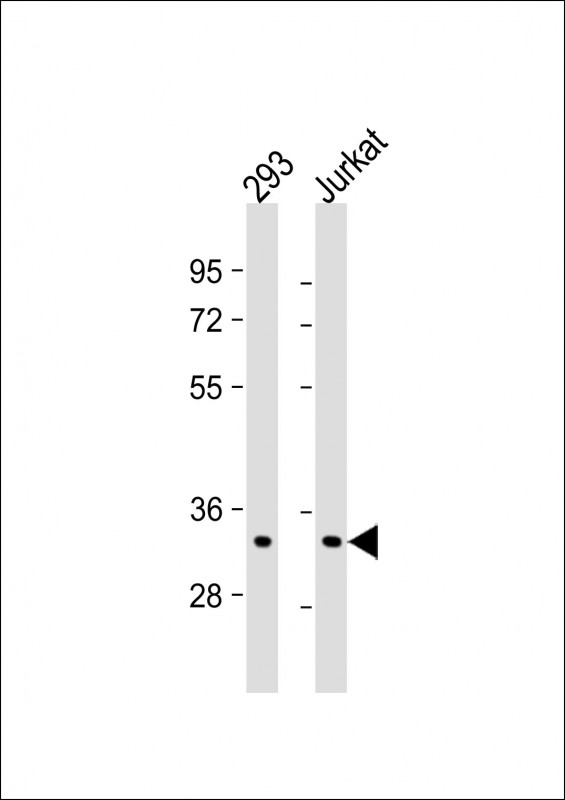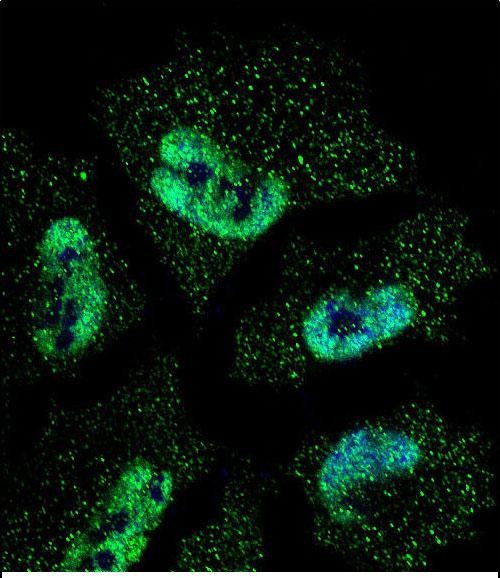

| WB | 1/1000 | Human,Mouse,Rat |
| IF | 咨询技术 | Human,Mouse,Rat |
| IHC | 咨询技术 | Human,Mouse,Rat |
| ICC | 1/10-1/50 | Human,Mouse,Rat |
| FCM | 咨询技术 | Human,Mouse,Rat |
| Elisa | 咨询技术 | Human,Mouse,Rat |
| Aliases | ELAV-like protein 1, Hu-antigen R, HuR, ELAVL1, HUR |
| Entrez GeneID | 1994 |
| WB Predicted band size | 36.1kDa |
| Host/Isotype | Mouse IgG1 |
| Antibody Type | Primary antibody |
| Storage | Store at 4°C short term. Aliquot and store at -20°C long term. Avoid freeze/thaw cycles. |
| Species Reactivity | Human |
| Immunogen | This ELAVL1 monoclonal antibody is generated from mouse immunized with ELAVL1 recombinant protein. |
| Formulation | Purified antibody in TBS with 0.05% sodium azide. |
+ +
以下是3-4条关于 **ELAVL1抗体** 的参考文献(示例格式):
---
1. **文献名称**: "ELAVL1 modulates the stability and nuclear export of transcripts containing AU-rich elements"
**作者**: Hinman MN, Lou H
**摘要**: 研究通过ELAVL1抗体进行免疫沉淀和Western blot分析,揭示了ELAVL1通过结合AU-rich元件(AREs)调控mRNA稳定性及核质运输的分子机制,强调了其在基因表达调控中的核心作用。
---
2. **文献名称**: "The RNA-binding protein HuR promotes tumor progression in triple-negative breast cancer"
**作者**: López de Silanes I, et al.
**摘要**: 通过免疫组化(使用ELAVL1/HuR抗体)和功能实验,发现HuR在三阴性乳腺癌中高表达,其核质定位与肿瘤侵袭性和患者预后不良相关,提示其作为潜在治疗靶点。
---
3. **文献名称**: "HuR regulates the DNA damage response through its interaction with BRCA1"
**作者**: Ghosh M, et al.
**摘要**: 利用ELAVL1抗体进行ChIP和共定位分析,证明HuR通过与BRCA1相互作用调控DNA损伤修复通路,影响癌细胞对化疗药物的敏感性。
---
4. **文献名称**: "HuR as a therapeutic target in chronic inflammatory diseases"
**作者**: Pereira B, et al.
**摘要**: 综述总结了ELAVL1(HuR)在炎症和癌症中的功能,强调其抗体在疾病模型中的研究价值,并探讨靶向HuR的临床转化潜力。
---
以上文献示例覆盖了ELAVL1在RNA调控、癌症机制及治疗中的应用研究,均涉及抗体实验方法(如Western blot、免疫组化等)。实际引用时需核对期刊名称、年份及具体细节。
**Background of ELAVL1 Antibodies**
ELAVL1 (Embryonic Lethal Abnormal Vision-like 1), also known as HuR, is an RNA-binding protein encoded by the *ELAVL1* gene. It belongs to the ELAV/Hu family and plays a critical role in post-transcriptional gene regulation by stabilizing target mRNAs or enhancing their translation. ELAVL1 binds to AU-rich elements (AREs) in the 3' untranslated regions (UTRs) of mRNAs involved in cell proliferation, survival, inflammation, and stress responses. Its dysregulation is linked to cancer, neurodegeneration, and immune disorders.
ELAVL1 antibodies are essential tools for studying its expression, localization, and function. These antibodies detect endogenous ELAVL1 in techniques like Western blotting, immunohistochemistry (IHC), and immunofluorescence (IF). Researchers use them to explore ELAVL1's role in mRNA stability, its interaction with RNA or protein partners, and its overexpression in malignancies (e.g., colon, breast cancers) where it promotes oncogene expression.
Commercial ELAVL1 antibodies are typically monoclonal or polyclonal, raised against specific epitopes (e.g., recombinant protein fragments). Validation includes testing in knockout cells or tissues to confirm specificity. Challenges include cross-reactivity with related Hu proteins (e.g., HuB/C/D) or variability due to post-translational modifications. Despite this, well-validated ELAVL1 antibodies remain vital for elucidating its biological and pathological mechanisms.
×